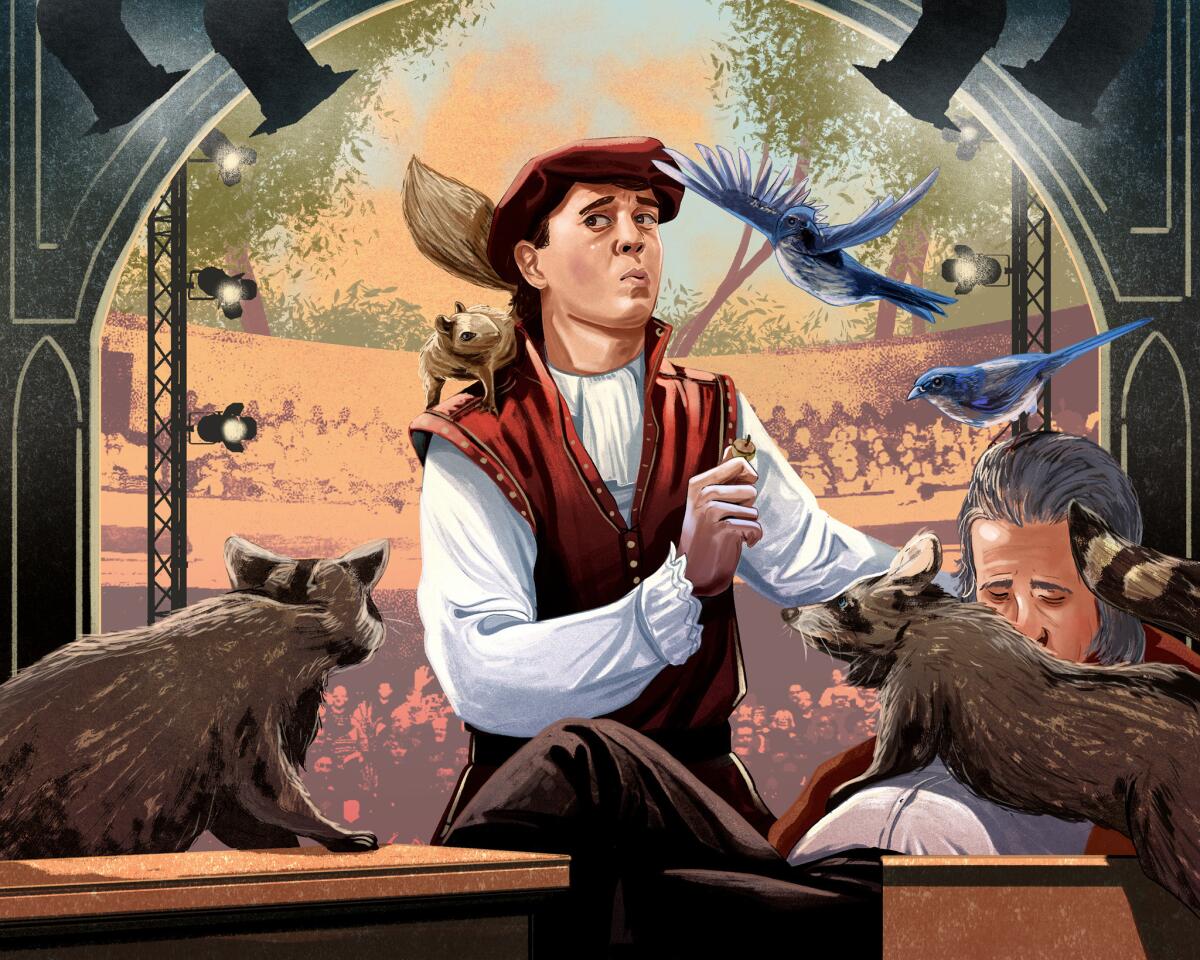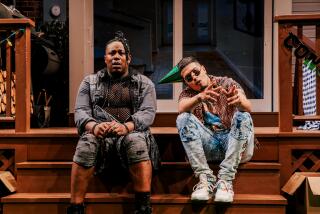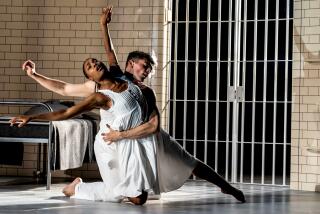Et tu, raccoon? How wildlife can steal the scene at Shakespeare in the park

Falstaff lay unmoving on a bench, eyes closed, so Prince Hal tried to rouse him by hurling walnuts at him.
But on the first night of the Shakespeare Center of Los Angeles’ “Henry IV” in June, the walnuts also grabbed the attention of a large scrub jay, which flew in and landed on Falstaff’s bloated belly. The audience roared with laughter at the unexpected guest, even after it flew away. But because Falstaff’s eyes were still closed and his belly was largely padding, the actor — a guy named Tom Hanks — had no idea what was preventing Hamish Linklater as Prince Hal from launching into his response.
“Everyone was laughing so hysterically I couldn’t speak,” Linklater said, “so I walked over to Tom and whispered in his ear what had happened.”
Inspired, Hanks’ Falstaff roused to life and improvised about birds in blank verse, Linklater said, talking about “the dove of peace on Noah’s Ark” before working his way back to his original line.
Summertime means outdoor theater, especially Shakespeare, and all the unpredictability that accompanies it. The changing daylight, heat and rain can be part of the equation, but it’s the truly unforeseeable factors — the flying golf balls or hovering helicopters or especially the owls, raccoons and coyotes — that can make shows so memorable for audience, cast and crew alike.
“This is living art,” said Gwen Turos, stage manager for the Oregon Shakespeare Festival.
Added David Melville, managing director for the Independent Shakespeare Company, which performs in Griffith Park: “The play is the thing, but the environment is a big element. There’s bound to be an element of chaos outdoors. It fosters a sense of community and is a reminder that theater is a collaborative effort of imagination for the audience and the actors together.”
For cast and crew, these challenges start before curtain. “Henry IV” was staged on the West Los Angeles VA campus near a golf course, Linklater said, so during technical rehearsals, golf balls occasionally pelted the stage. “That was unnerving.”
Melville said that when his crew builds sets, they may find diamondback rattlesnakes basking in the sun. Turos said the Oregon festival once had to remove a wasp’s nest from near the audience entrance.
But it’s the wildlife that inadvertently participates in the productions that gains the most attention. New York’s famed Delacorte Theater in Central Park has long hosted raccoons. There’s even a Shakespeare Raccoon Twitter account. During the 2015 “Cymbeline” (starring Linklater), a raccoon loved prop purses so much, it would steal one nightly, stage manager James Latus said.
“Somewhere in Central Park is a raccoon den lined with 50 beautiful leather purses,” he said.
The raccoon population seems to be growing and, Latus said, “they’re much more aggressive and more present now.” He provides written instructions for dressing room snacks to be kept sealed in metal or hard plastic containers. This year, he sent a crew member to a workshop led by park rangers, leading to a new policy of taking a stand — “get big and make noise and chase them off” — though, obviously, not during a performance.
Occasionally, a baby raccoon will get trapped or lost backstage and cry and scream, but often one will just stride silently across the stage, oblivious to the action.
One of the great things about acting outdoors is you can’t be perfect, so you learn quickly not to be precious,
— Actor Corey Stoll
Corey Stoll was delivering a malevolent soliloquy as Iago on the final night of “Othello” in June when a raccoon walked behind him. Stoll said the stage is so large, sometimes the raccoons pass through unnoticed, but on that night, the audience started giggling.
“You can tell by the quality of the laughter that a raccoon is upstaging you,” said Stoll, who glanced at the raccoon but did not acknowledge it. “You just have to block it out.”
A friend of Stoll’s suggested that he buy a coonskin hat so on nights the raccoon appeared, he could wear it in the next scene, implying that Iago had killed it.
“I never did it, but the next person playing a Shakespeare character who would believably have murdered and skinned a raccoon should steal that gag,” he said.
John Douglas Thompson, who played Cassius (to Stoll’s Brutus) in “Julius Caesar” at the Delacorte last summer, said the raccoons’ constant presence eventually got in his head.
“One night when Cassius was killed and I lay ‘dead’ onstage, I swore they were all around me sniffing me,” he said. “It wasn’t true; it was just in my mind. But I felt helpless, like I was having an out-of-body experience.”
It can happen, Latus said: During “Henry V,” a raccoon walked right over a character who had just died. The actor held his tongue, though the actress who had a rat walk across her bare feet backstage did not, letting loose a bloodcurdling scream. (Rats, fortunately, are relatively rare.)
Turos said Oregon audiences had to endure inhuman shrieks nightly during the 2014 production of “Richard III.” An owl had built a roost above the stage.
“Right when Richard was saying, ‘Now is the winter of our discontent,’ was dinner time and the owlettes would screech, calling for food, and then, the mother would swoop over the audience with a mouse or whatever and fly to them,” Turos said. She added that the legally protected babies could not be moved until they matured. “We had to give an owl speech before each show to explain what was happening.”
When the young owls had grown older, the scene shop, in consultation with the forestry service, built another roost nearby and relocated the birds, Turos said.
During one performance, an owl was heard hooting when Richard says, “Out on ye, owls! nothing but songs of death.”
Patrick Vest, who has acted in and directed Shakespeare by the Sea performances around Los Angeles and Orange counties, said the animals can enhance as often as they distract. Once while he was playing Macbeth and declaiming about the darkness, a slew of birds suddenly flew out of the darkness, menacing the audience. “Sometimes it works in our favor,” he said.
Richard Azurdia was cursing the gods as Macbeth for ISC when the Griffith Park coyotes started howling. (He ad-libbed a line in response.) Melville said the coyotes howled while he played Iago, and he acknowledged them with a smile, as if the predators were Iago’s buddies.
“It’s a case-by-case basis, but sometimes, it’s essential to acknowledge them or you can’t get the play back because the audience starts worrying or tittering,” Melville said.
When the coyotes regularly howled during Ophelia’s burial in “Hamlet,” the effect felt so naturally spooky that audience members thought it was a sound cue. (Azurdia said the coyotes sometimes come down a path behind the stage, but what really creeps out the cast and crew is when they see the eyes of a pack glowing in the dark.)
In Santa Ana, when parrots shrieked and dive-bombed the audience during “A Midsummer Night’s Dream,” Vest said the actor playing Puck ad-libbed and had fun with them. After all, he said, it’s the easiest play to adapt to strange circumstances. “It’s calamity-proofed,” he said.
Although the audience cheered in delight when a real bunny recently ran through the forest onstage in Griffith Park’s “Midsummer,” the creatures that audiences don’t see often can be bigger distractions for the actors. Melville got stung in the head by a bee while playing King Leontes in “The Winter’s Tale.” Fortunately, his character was “in the throes of agony,” he said. “I shrieked, but the pain was real and the audience didn’t know.”
For Azurdia, problems arise when he opens his mouth to speak and bugs fly in. During “Midsummer,” he said, he nearly choked on one. It’s one of the things you don’t learn in school, he said. “I tell newcomers, ‘No cologne, no sweet hairspray, or the bugs go right to you.’ You cannot focus when you have flies all over you.”
Bugs are bad, but slugs are worse, said Linklater, whose mother was a founder of Shakespeare & Company in Massachusetts, where the wood stage would get slick with slug trails that could send actors skidding during sword fights. He recalled one messenger kneeling before a king and squishing a gooey slug.
Sometimes, however, the most unpredictable and disruptive species is Homo sapiens. At the Delacorte last summer, “Julius Caesar” was halted several times after Trump supporters stormed the stage to protest what they saw as unfair criticism of the president. Latus and Thompson say the outdoor environs emboldened the demonstrators because the park is open.
Stoll said that while it was exciting to be part of a larger conversation, the experience was unnerving as the actors, at a moment of “emotional elevation” in the play, had to remain neutral and professional. The audience remained supportive through it all, he said. “When the announcement came that we would resume at the line about freedom and liberty, we got the most unified standing ovation I’ve ever heard.”
Shakespeare by the Sea’s Vest said that during the trial scene in this summer’s “Winter’s Tale,” in which Hermoine pleads for her life, a woman in the audience repeatedly yelled at another person, “You stole my baby.” The cast just plowed ahead. But Vest declared “the lowest form of humanity” to be the people who drive by honking or screaming just to get attention, and though they fill him with rage, he said, actors are trained to overcome these kinds of distractions. Ironically, the interruptions may help to keep actors in the moment.
For Stoll, the intrusions can even enhance the performance.
“One of the great things about acting outdoors is you can’t be perfect, so you learn quickly not to be precious,” he said. “It gives you license to loosen up a little bit.”
Thompson said most actors not only accept the unpredictability but embrace it.
“We are lucky to be doing Shakespeare the way it was supposed to be done. There’s something romantic about that and something spiritual about reconnecting to that environment,” he said. “Even people who don’t think they like Shakespeare will come to sit under the stars, and it can be a transformative experience.”
See all of our latest arts news and reviews at latimes.com/arts.
More to Read
The biggest entertainment stories
Get our big stories about Hollywood, film, television, music, arts, culture and more right in your inbox as soon as they publish.
You may occasionally receive promotional content from the Los Angeles Times.






